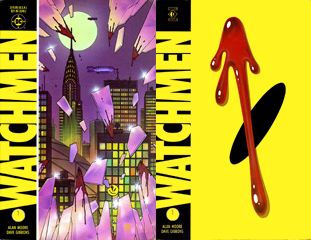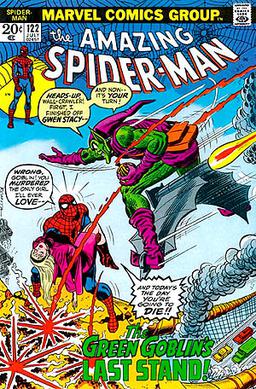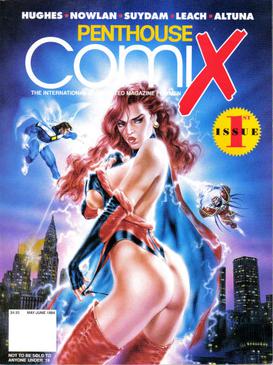
A comic book, also called comicbook, comic magazine or simply comic, is a publication that consists of comics art in the form of sequential juxtaposed panels that represent individual scenes. Panels are often accompanied by descriptive prose and written narrative, usually, dialogue contained in word balloons emblematic of the comics art form.

Marvel Comics is an American comic book publisher and the property of The Walt Disney Company since December 31, 2009, and a subsidiary of Disney Publishing Worldwide since March 2023. Marvel was founded in 1939 by Martin Goodman as Timely Comics, and by 1951 had generally become known as Atlas Comics. The Marvel era began in August 1961 with the launch of The Fantastic Four and other superhero titles created by Stan Lee, Jack Kirby, Steve Ditko, and many others. The Marvel brand, which had been used over the years and decades, was solidified as the company's primary brand.

Dark Horse Comics is an American comic book, graphic novel, and manga publisher founded in Milwaukie, Oregon by Mike Richardson in 1986. The company was created using funds earned from Richardson's chain of Portland, Oregon, comic book shops known as Pegasus Books and founded in 1980.

A British comic is a periodical published in the United Kingdom that contains comic strips. It is generally referred to as a comic or a comic magazine, and historically as a comic paper. As of 2014, the three longest-running comics of all time were all British.
First Comics is an American comic book publisher that was active from 1983 to 1991 and then from 2011 to present, known for titles like American Flagg!, Grimjack, Nexus, Badger, Dreadstar, and Jon Sable. Along with competitors like Pacific Comics and Eclipse Comics, First took early advantage of the growing direct market, attracting a number of writers and artists from DC and Marvel to produce creator-owned titles, which, as they were not subject to the Comics Code, were free to feature more mature content.

An American comic book is a thin periodical originating in the United States, on average 32 pages, containing comics. While the form originated in 1933, American comic books first gained popularity after the 1938 publication of Action Comics, which included the debut of the superhero Superman. This was followed by a superhero boom that lasted until the end of World War II. After the war, while superheroes were marginalized, the comic book industry rapidly expanded and genres such as horror, crime, science fiction and romance became popular. The 1950s saw a gradual decline, due to a shift away from print media in the wake of television and the impact of the Comics Code Authority. The late 1950s and the 1960s saw a superhero revival and superheroes remained the dominant character archetype throughout the late 20th century into the 21st century.
Harris Publications Inc. was an American special interest media company, operating over 75 brands with print, digital, mobile and live event platforms prior to its sale to Athlon Media in 2016. It produced magazines that educate, entertain, inform and inspire. Subject matters spanned an array of interests including decorating, gardening, beauty, automotive, sports, outdoor living, history, tactical, entertainment and wellness. Harris' titles covered a variety of markets and focused on niche special interests, primarily in the United States.

In comics, a one-shot is a work composed of a single standalone issue or chapter, contrasting a limited series or ongoing series, which are composed of multiple issues or chapters. One-shots date back to the early 19th century, published in newspapers, and today may be in the form of single published comic books, parts of comic magazines/anthologies or published online in websites. In the marketing industry, some one-shots are used as promotion tools that tie in with existing productions, movies, video games or television shows.
Titan Publishing Group is the publishing division of the British entertainment company Titan Entertainment, which was established as Titan Books in 1981. The books division has two main areas of publishing: film and television tie-ins and cinema reference books; and graphic novels and comics references and art titles. Its imprints are Titan Books, Titan Comics and Titan Magazines.

GamePro was an American multiplatform video game magazine media company that published online and print content covering the video game industry, video game hardware and video game software. The magazine featured content on various video game consoles, personal computers and mobile devices. GamePro Media properties included GamePro magazine and their website. The company was also a part subsidiary of the privately held International Data Group (IDG), a media, events and research technology group. The magazine and its parent publication printing the magazine went defunct in 2011, but is outlasted by Gamepro.com.
Diamond Comic Distributors, Inc. is an American comic book distributor serving retailers in North America and worldwide. They transport comic books and graphic novels, as well as other popular culture products such as toys, games, and apparel from comic book publishers or suppliers to retailers.
Comic book collecting is a hobby that treats comic books and related items as collectibles or artwork to be sought after and preserved. Though considerably more recent than the collecting of postage stamps (philately) or books (bibliophilia), it has a major following around the world today and is partially responsible for the increased interest in comics after the temporary slump experienced during the 1980s.

The Modern Age of Comic Books is a period in the history of American superhero comic books which began in the mid-1980s and continues through the present day. During approximately the first 15 years of this period, many comic book characters were redesigned, creators gained prominence in the industry, independent comics flourished, and larger publishing houses became more commercialized.

The Bronze Age of Comic Books is an informal name for a period in the history of American superhero comic books, usually said to run from 1970 to 1985. It follows the Silver Age of Comic Books and is followed by the Modern Age of Comic Books.

Martin Goodman was an American publisher of pulp magazines, digest sized magazines, paperback books, men's adventure magazines, and comic books, who founded the comics magazine company Timely Comics in 1939. Timely Comics would go on to be become Marvel Comics, one of the United States' two largest comic book publishers along with rival DC Comics.

The direct market is the dominant distribution and retail network for American comic books. The concept of the direct market was created in the 1970s by Phil Seuling. The network currently consists of:

Penthouse Comix is an American mass-market, magazine-sized comic book, published by Penthouse International/General Media Communications from spring 1994 through July 1998. Founded and initially edited by George Caragonne and Horatio Weisfeld, it originally ran 32 issues plus one special edition. Foreign versions of Penthouse Comix remained in publication through 2011.
Titan Entertainment is a British entertainment company. It was founded from Forbidden Planet London in 1993 by Nick Landau and Vivian Cheung. The company comprises Forbidden Planet Limited and Titan Publishing Group, which has four divisions: Titan Books, Titan Comics, Titan Magazines, and Titan Merchandise.

Skybound Entertainment is an American multiplatform entertainment company founded by Robert Kirkman and David Alpert. It operates in concert with Image Comics.

Canadian comics refers to comics and cartooning by citizens of Canada or permanent residents of Canada regardless of residence. Canada has two official languages, and distinct comics cultures have developed in English and French Canada. The English tends to follow American trends, and the French, Franco-Belgian ones, with little crossover between the two cultures. Canadian comics run the gamut of comics forms, including editorial cartooning, comic strips, comic books, graphic novels, and webcomics, and are published in newspapers, magazines, books, and online. They have received attention in international comics communities and have received support from the federal and provincial governments, including grants from the Canada Council for the Arts. There are comics publishers throughout the country, as well as large small press, self-publishing, and minicomics communities.













